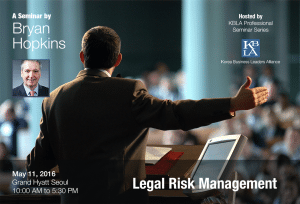 For those of you who engage in business, everyone knows that properly managing risk plays an important part in the success of a company. However, though some companies may acknowledge the benefits of risk management , many don't consider legal risk management (LRM) processes when trying to mitigate or control and manage litigation risk issues, government investigations as well as legal liability. The benefits of ERM managment is never fully realized, leaving the company exposed to the tremendous costs associated with legal and corporate liability.
For those of you who engage in business, everyone knows that properly managing risk plays an important part in the success of a company. However, though some companies may acknowledge the benefits of risk management , many don't consider legal risk management (LRM) processes when trying to mitigate or control and manage litigation risk issues, government investigations as well as legal liability. The benefits of ERM managment is never fully realized, leaving the company exposed to the tremendous costs associated with legal and corporate liability. Reputational risk or the risk of damage to a company’s brand is of course very important these days. It is of primary importance to executives and risk managers in many multinational companies and is seen as one of the top risks a company may face. In fact, in Aon’s Global Risk Management Survey 2015, of the top ten risks that are of concern to companies, damage to reputation/brand is listed as number one. (more…)
Reputational risk or the risk of damage to a company’s brand is of course very important these days. It is of primary importance to executives and risk managers in many multinational companies and is seen as one of the top risks a company may face. In fact, in Aon’s Global Risk Management Survey 2015, of the top ten risks that are of concern to companies, damage to reputation/brand is listed as number one. (more…)
 The Impact of Korea’s New Anti –Corrution Laws On Internal Investigations
The Impact of Korea’s New Anti –Corrution Laws On Internal Investigations
Korean companies are now faced with issues that they have not had to deal with before- namely anti-corruption domestic laws ( the Kim Young-Ran Act or the “Act”) that provides criminal penalties for bribery, vicarious liability extending criminal penalties not only to the employee but the employer as well and expanding bribes to also include the exchange of monetary interest without a duty relation component. This puts Korean companies in a difficult position domestically as not only do Korean companies have to worry about prosecution under the new Act, but they also should worry about how this relates to the FCPA and UK Anti-Bribery Act. (more…)
 Compliance- A Shining City by the Sea
Compliance- A Shining City by the Sea
Recently, Yonhap News of Korean announced that South Korea will conduct fuel efficiency tests on Volkswagen models that have been imported into Korea after the news that Volkswagen admitted to falsifying fuel emission tests results. It did this by using software that activates emission controls only when the car is being tested. How serious is this? It’s a PR nightmare!
In fact, the fuel emission scandal is so serious that the CEO of Volkswagen stepped down though he claims he was not aware of any wrongdoing. The US EPA has announced that pollution level of the diesel engine used in Volkswagen models could be 40 times higher than previously thought. Shortly after the scandal broke, Volkswagen’s shares tumbled by more than 30 percent. South Korea will now initiate an investigation into the fuel emission issue on Volkswagen and Audi models as is other countries such as the US, China and the UK. There are reports of class action lawsuits as well as criminal investigations by the DOJ and other regulators including those from Germany. All told, Volkswagen could face legal fines in the US of up to $18 Billion US besides fines in Germany and elsehwere.
What happened? How could this of happened if strong compliance controls and risk management processes and procedures were in place to prevent such a catastrophe? The answer is that in Volkswagen there was a lack of strong compliance controls and risk management processes. Though in this age and time, it is incredible that a company the size of Volkswagen could let a scandal like this happen is amazing. The fact that the software was put in place meant more than one engineer was involved. Volkswagen now admits that at least 11 million cars were equipped with the software devices that cheated on fuel emissions. Something this massive can only result when there is a complete breakdown of ethics and corporate social responsibility in all levels of management. It is most likely that Volkswagen Upper Management knew about the software devices and probably someone at the Board level was aware of it too. Therefore, the compliance culture at VW broke down over the years.
When President Ronald Regan ran for the US Presidency, he often talked on how the US was “the shining city upon the hill.” This was when the cold war was still rampant and that the West viewed the US as the last bastion of hope. Today, with the cold war allegedly behind us, much of the world is engaged in blaming companies for all of the evils that have befallen the world. In response, most Western companies as well as companies in Asia and elsewhere have enacted compliance processes, corporate social responsibility programs and corporate ethical codes of conduct in an attempt to show how responsible they are as good corporate citizens. Most agree they must foster a culture of compliance within the organization if anything meaningful is to happen.
Today’s compliance tools and risk management processes are quite sophisticated. Regulators are aggressively punishing those that violate laws and of course corporate compliance mandates. The FCPA and other anti-bribery laws are being enforced around the world. The US Department of Justice has aggressively expanded its reach around the world. Why? Companies are held to a much high standard of conduct by society than before. In a sense, the rules of business has changed. It’s no longer just about profit and satisfying shareholders but it is also about responsibility to society. In essence it is about becoming that “shining city on the hill” or as I would like to put it, as reflected by the picture to the right of Gwangali Beach, Busan, becoming “that shining city by the sea”!
What does the latest corporate scandal from Germany (remember Siemens?) remind us of? It reminds us that compliance is not a minor issue to be handled at the lower levels of management. It reminds us that risk management processes and tools such as compliance, ethics training and management buy in are necessary and should be implemented on a daily basis. Though the vast majority of companies follow the law and abide by the corporate codes of conduct they have implemented, some companies clearly have not. It also teaches us that one can never be too diligent when dealing with an ethical culture- that compliance and ethics must be taught and reinforced everyday.
This is a wake up call on the part of companies throughout the world. Disregard compliance at your peril. Treat compliance as the shining city by the sea. Something to strive and hope for.
 Successful Risk Management Requires A View From The Top Not A View From The Trenches
Successful Risk Management Requires A View From The Top Not A View From The Trenches
Today I was fortunate to visit a large electronics company in Seoul. In fact, I was on the 39th floor of the company located in southern Seoul and had an amazing view of Seoul- as evidenced by the picture to the left. (more…)
The Korea Fair Trade Commission (KFTC) has recently revised its unfair trade practices guidelines (UFP Guidelines) to protect consumers with regards to e-Commerce transactions. The UFP Guidelines took effect as of August 20, 2015 and cover several new types of e-Commerce transactions. The UPF Guidelines include recommended practices in the field of (i) social commerce transactions and (ii) price comparison websites. The revisions are quite detailed in nature and cover such areas as follows:
1. Social commerce sites- the UFP Guidelines regarding social commerce websites have been revised to include the requirement that the product or service advertised on the website must clearly describe the previous price it was traded at. The UFP Guidelines also provides that the site operators shall have the service providers not to discriminate between ordinary customers and the users of coupons.
2. Price comparison websites- the UFP Guidelines have been revised to cover price comparison websites. The UFP Guidelines provides that in case of price comparison sites, prices must be compared under the same conditions using the same criteria. The site must compare prices that include option items prices, delivery and installation costs.
The UPF Guidelines also includes examples of violations especially with regards to cancellation policies. The UFP Guidelines prohibits e-commerce companies from requesting unreasonable return costs (except for delivery cost) in case of cancellation of the order. The UPF Guidelines cover these areas in detail and such terms and conditions of sale are subject to KFTC scrutiny. It is recommended therefore that foreign companies seek advice of Korean counsel prior to selling online to Korean consumers.